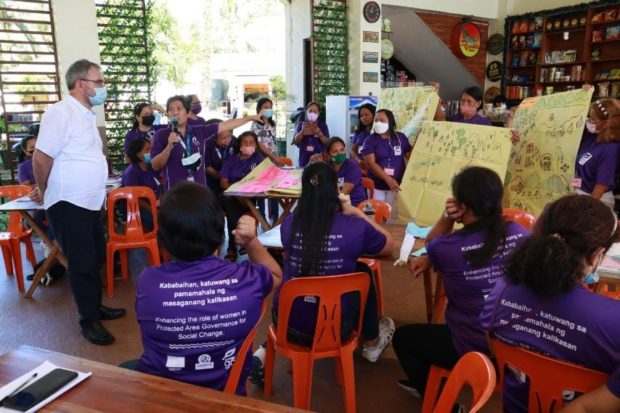
EU Ambassador to the Philippines Luc Véron attends an environmental and gender and development training organized under the Women Go project. (Photo from EU Delegation to the Philippines Facebook page)
MANILA, Philippines — “Women are key actors in the inclusive and sustainable management of natural resources in the Philippines.”
Luc Véron, the European Union ambassador to the Philippines, stressed this point during his two-day visit to Quezon province to oversee projects pushing for women’s engagement in natural resources governance.
Véron capped off his visit on Wednesday after a series of meetings with mayors, women leaders, and civil society organizations in the towns of Real, Infanta, and General Nakar, according to a statement issued by the EU Delegation to the Philippines.
His visit was focused on the Women Go and Forest Governance projects, which are implemented by the civil society organization Haribon Foundation and funded by the EU.
Among those he met were women leaders of Kalipunan ng Liping Pilipina (KALIPI) Federations and Organizations and Kilos Unlad ng Mamamayan ng REAL (KUMARE).
The EU, Véron said, is “determined to act on the gender dimension of environmental degradation and climate change and wants to contribute to promoting girls’ and women’s participation and leadership, through support to civil society organizations’ initiatives like the project implemented by Haribon.”
“Forests play a very significant role in the context of climate change by absorbing CO2, by helping prevent floods, retaining water for domestic use and agriculture and providing various sources of livelihood. It is why the EU supports forest governance actions,” Véron also said.
According to the EU delegation, the Women Go project seeks to increase the level of influence and leadership of women in rural areas in the governance of protected areas and in sustainable programs on climate change adaptation, disaster risk reduction, and livelihood.
Meanwhile, the regional Forest Governance project “aims to increase participation of forest-dependent communities in forest governance and policy processes, to effectively contribute to forest management and land use planning, across three Key Biodiversity Area sites, including Mount Irid-Angelo, in Sierra Madre.”
Among the activities that Véron participated in was a training on environmental leadership and organizational development for women leaders and a gender sensitivity and natural resource management training workshop for women leaders and their husbands.
He also planted kamagong and narra seedlings at the Native and Fruit-bearing Tree Nursery site in Infanta.
“The planting of these seedlings symbolizes the efforts made to conserve the environment and the forests that protect community members from floods, provide sources of livelihood and help in the fight against climate change,” the EU delegation said.
RELATED STORIES
Robredo enjoins women to answer leadership calls, face trials with resolve
Women power in Sarangani Bay keeps coral predators away